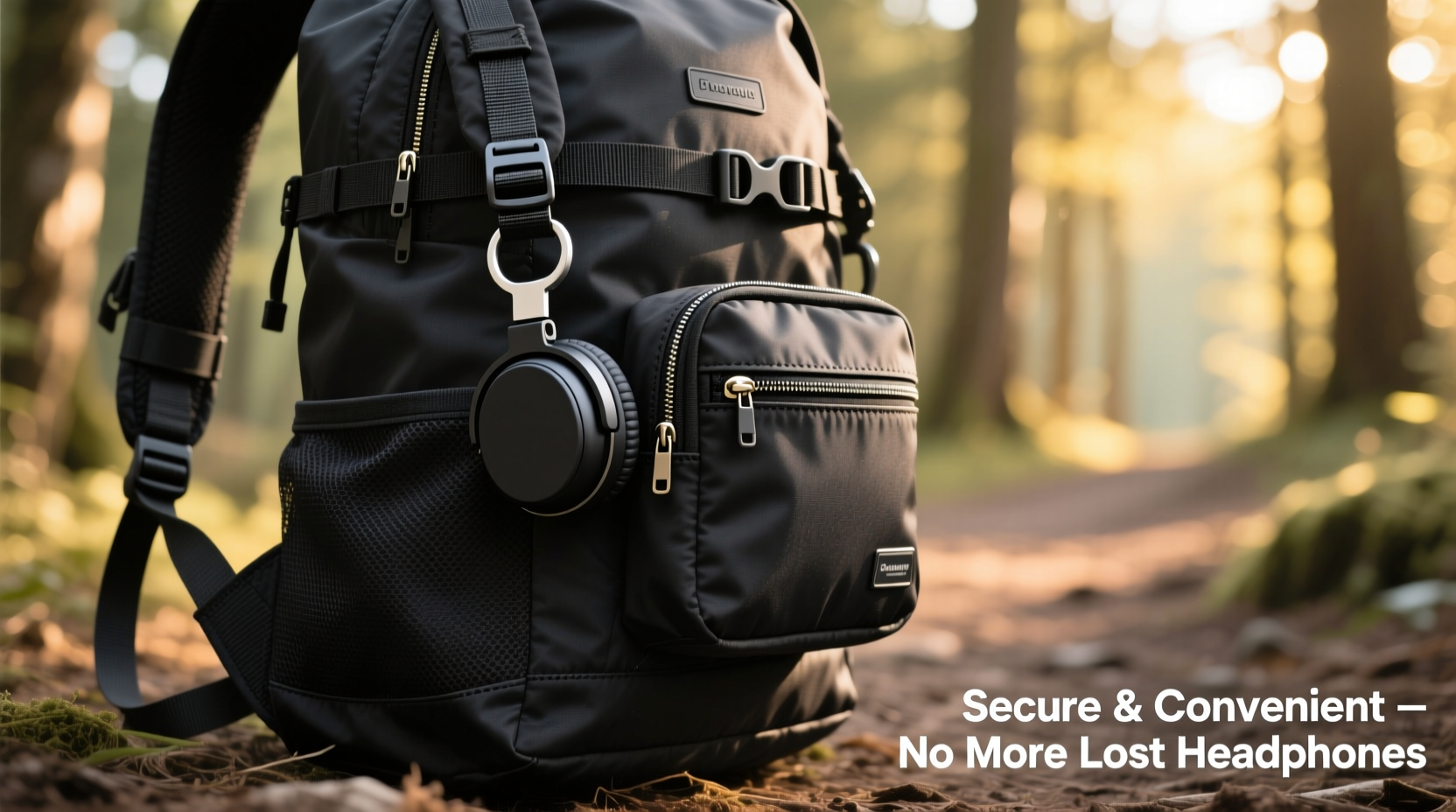Carrying headphones while on the move is essential for many—commuters, students, travelers, and outdoor enthusiasts alike. But loose cords, misplaced earbuds, or bulky cases can turn convenience into frustration. A mini backpack headphone bag solves this by offering dedicated storage, but only if it’s attached properly. The real challenge isn’t owning one—it’s securing it in a way that’s both safe and accessible. Poor attachment leads to loss, snagging, or constant readjustment. This guide explores proven, innovative methods to integrate your headphone bag seamlessly into your backpack setup, ensuring reliability, ease of access, and long-term durability.
Why Proper Attachment Matters

A mini headphone bag is designed to protect delicate audio gear, reduce cable tangles, and keep essentials like adapters or cleaning tools within reach. However, its value diminishes if it dangles loosely, swings with every step, or blocks access to other compartments. Secure attachment prevents accidental detachment during transit, reduces wear on zippers and straps, and maintains balanced weight distribution across your backpack. More importantly, it ensures that when you need your headphones—whether to take a call, listen to music, or block out noise—they’re immediately available without fumbling.
“Accessibility and security go hand-in-hand when integrating small accessories into larger carry systems.” — Jordan Lee, Outdoor Gear Designer at TrailForm Labs
Top 5 Practical Attachment Methods
Not all attachment solutions are created equal. Some prioritize speed, others durability. Below are five reliable methods tested in real-world conditions—from city commutes to hiking trails.
1. Utilize Existing Compression Straps
Most modern backpacks feature compression straps on the sides or front. These sturdy webbing loops are ideal anchor points. Slide the handle or loop of your headphone bag through the compression strap, then tighten. This keeps the bag flat against the pack, minimizing movement.
2. Clip-On Carabiner System
A micro carabiner (preferably locking) offers quick-connect functionality. Attach one end to the headphone bag’s D-ring and clip the other to any available loop—luggage tags, hydration port anchors, or even unused sternum strap buckles. Choose lightweight titanium or aluminum models to avoid adding bulk.
This method shines for frequent access. You can unclip the entire bag in seconds, use your headphones, and reattach without adjusting straps or zippers.
3. MOLLE Webbing Integration
If your backpack features MOLLE (Modular Lightweight Load-carrying Equipment) webbing—common on tactical, travel, or hiking packs—you can weave the headphone bag’s straps directly through the grid. Use a simple over-under threading technique to lock it in place. For added security, finish with a half-hitch knot using paracord lacing.
MOLLE provides military-grade stability. Once threaded, the bag won’t shift even during vigorous activity. It also allows precise positioning—ideal for keeping the bag visible yet out of the way.
4. Magnetic Mount with Backup Tether
For tech-savvy users, a magnetic mounting solution offers sleek integration. Sew or adhere a small neodymium magnet inside the headphone bag and pair it with a metal plate affixed to your backpack’s exterior fabric (use reinforced adhesive or stitch it into a seam). The magnets snap together instantly.
To prevent loss if the magnet detaches, add a short braided nylon tether between the bag and a nearby loop. This hybrid approach combines convenience with fail-safe security.
5. Zipper Pull Extension Hack
Repurpose your backpack’s main compartment zipper pull as an anchor. Replace the default pull tab with a longer zipper garland or lanyard, then slide the headphone bag onto it like a keychain. When the backpack is closed, the bag rests neatly on the front panel; when open, it hangs just outside the opening for immediate access.
This method works best with compact, soft-shell headphone pouches weighing under 4 oz. Avoid overloading to prevent strain on the zipper mechanism.
Comparison Table: Attachment Methods at a Glance
| Method | Security Level | Access Speed | Bulk Added | Best For |
|---|---|---|---|---|
| Compression Straps | High | Medium | Low | Daily commuters, hikers |
| Carabiner Clip | Medium | Very High | Very Low | Frequent users, urban travelers |
| MOLLE Weaving | Very High | Low | Low | Tactical packs, outdoor gear |
| Magnetic + Tether | High | High | Low | Minimalist setups, tech lovers |
| Zipper Pull Mount | Medium | High | None | Lightpackers, students |
Step-by-Step: Installing a MOLLE-Compatible Headphone Bag
If you're using a backpack with MOLLE webbing, follow these steps for a secure, clean installation:
- Inspect the MOLLE Grid: Identify a vertical column of PALS (Pouch Attachment Ladder System) webbing on the side or front panel.
- Align the Bag: Hold the headphone bag flush against the backpack, ensuring its attachment straps align horizontally with the webbing.
- Weave the Straps: Thread each strap over one row of webbing, under the next, repeating for at least three rows.
- Tighten and Lock: Pull straps snug and fold excess through a buckle or sewn loop to prevent loosening.
- Test Stability: Gently tug the bag from multiple angles. It should not pivot or slide.
Real-World Example: Commuter Student Success Story
Sophia, a university student in Chicago, carried her AirPods case in her jacket pocket until she lost it twice in one semester. She purchased a slim neoprene headphone bag with a D-ring and experimented with placements on her Osprey Daylite. After trying a carabiner on her shoulder strap (which swung annoyingly), she switched to weaving the bag into the MOLLE grid on the front panel. Now, she accesses her headphones in under five seconds while walking between classes. “It stays put, looks intentional, and I haven’t worried about losing anything since,” she says.
Do’s and Don’ts of Accessory Attachment
- Do match the attachment method to your backpack’s design features.
- Do check tension regularly—especially after washing or heavy use.
- Do consider weather resistance; some clips degrade in UV light or cold.
- Don’t overload small bags beyond their intended capacity.
- Don’t attach items that obstruct ventilation panels or safety reflectors.
- Don’t rely solely on weak fabric loops not designed for load-bearing.
Frequently Asked Questions
Can I permanently sew a headphone bag onto my backpack?
Yes, but only if you’re certain about placement and don’t plan to remove it. Use UV-resistant nylon thread and reinforce stitching with bar tacks. Permanent attachment increases durability but reduces flexibility for future gear changes.
Will magnets damage my headphones?
Modern headphones, especially wireless earbuds, are generally resistant to small magnetic fields. However, avoid placing strong magnets directly against driver housings. Stick to low-strength magnets (under 1 lb pull force) for peace of mind.
What’s the lightest secure option?
A micro carabiner clipped to an existing loop is typically the lightest secure method, adding less than 0.3 oz. Pair it with a stretch mesh pouch for minimal footprint and maximum function.
Final Checklist Before You Attach
- Confirm your backpack has compatible attachment points (straps, loops, MOLLE).
- Select a method based on how often you access your headphones.
- Ensure the combined weight won’t stress seams or zippers.
- Test the setup with full backpack weight (books, laptop, etc.).
- Adjust position for balance and comfort during extended wear.
Conclusion
Attaching a mini backpack headphone bag isn’t just about convenience—it’s about optimizing your carry system for efficiency, safety, and longevity. Whether you choose mechanical clips, woven integration, or smart magnetic assists, the right method transforms a simple pouch into an intuitive extension of your gear. Thoughtful attachment prevents loss, enhances accessibility, and preserves the integrity of both your backpack and electronics. Take a few minutes today to evaluate your current setup. Experiment with one of these techniques, refine it, and enjoy the confidence that comes with knowing your essentials are secure, organized, and always ready.









 浙公网安备
33010002000092号
浙公网安备
33010002000092号 浙B2-20120091-4
浙B2-20120091-4
Comments
No comments yet. Why don't you start the discussion?